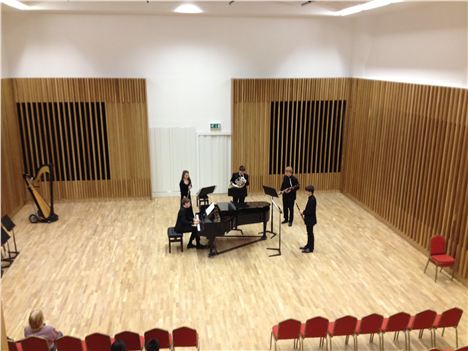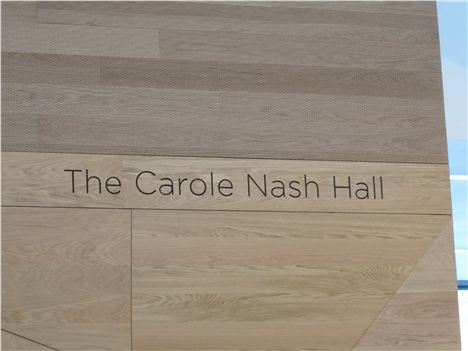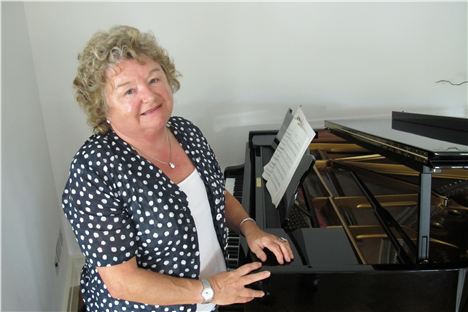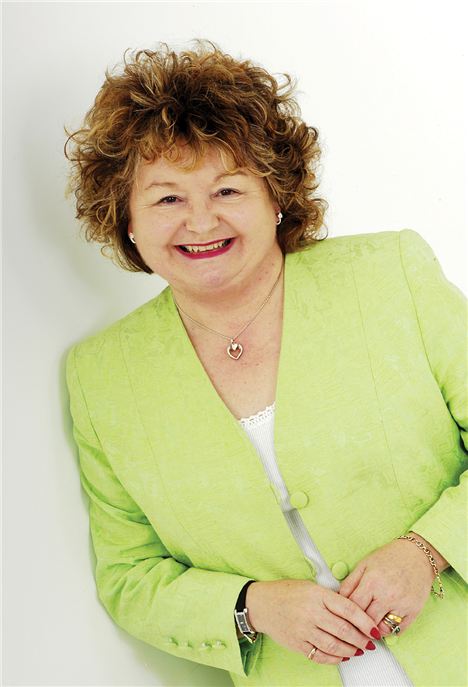The grandma and the businesswoman
SHE’s been honoured by the Queen with an OBE, she’s an entrepreneur, she’s a philanthropist and she’s a millionaire.
But Carole Nash is also a proper grandma, gentle, concerned and wry.
The living room of her Bowdon house looks like a construction site in minature. She holds a regular Lego club for her eight grandchildren and the results are strewn around. Pictures of the family are everywhere too.
With my redundancy money of £2,300 I bought a professional indemnity insurance for £2000 and with the rest got a telephone on the window sill in the dining room and some paper and pencils. And that’s how it started.
Yet her low voice and carefully considered phrases make her an unlikely former business woman. The success speaks for itself.
Over a couple of decades she built a motorcycle insurance business that she sold in 2006 for £74m - it's still going and still employs 300 people with policies for 300,000 classic, vintage, modern, custom and off road motorcycles.
She now gives chunks of that £74m away in astounding acts of philanthropy, including around £300,000 recently to Chetham's School of Music for a new performance space. She also works a great deal with charities.
The way to succeed without talking about yourself very loudly
Carole Nash seems to have found an alternative path to business success.
Surely those who succeed in business are supposed to have the mindset of efficient assassins? Well, at least if the BBC's The Apprentice is anything to go by, laughable though it can be.
"I never intended to be a professional business woman," she says. "It came about by accident.
"I met Freddy, my husband, in a Manchester insurance company. Eventually I gave up work when I had the children. Then Malcolm, our son, passed the exams for Manchester Grammar, and that was just within our budget. When Jane, our daughter, who is a talented musician, got the opportunity to go to Manchester High School for Girls, I needed to help pay the bills. So I went back to work for three days a week in a Timperley-based insurance company.
"In 1985 the insurance company closed the office and made us redundant. I was looking after the motorcycle section. Within this was a part for the ‘old boys on the old bikes’ as I called them. It was the only insurance for them around and there were 200-300 policies.
"So I came home and had a think. And then with my redundancy money of £2,300 I bought a professional indemnity insurance for £2000 and with the rest, got a telephone on the window sill in the dining room and some paper and pencils. And that’s how it started. November 1st it was, in 1985 and it changed my life. I was well into my forties. Previously I'd been at home baking and cooking, now the new job became more and more important.
"I moved from a window sill to the garage and in 1989 the work was coming in so fast I got an office in Timperley with four of us working on it."
"I think in some respects I'm a bit soft," she says. "Funnily enough I have quite low self-esteem. I tend to keep in the background. This can be difficult in professional life. I was the first woman to be a broker."
"So what was the secret to the growth?" I ask.
Carole Nash thinks for a second.
"I think I was just nice to people," she says. "I've thought about this and I think I came across as someone very interested in my customers and pleasant and polite to them. And because of that other bikers and clubs started ringing me and eventually it snowballed and we were doing new bikes as well.
"You know," she continues, "I used to be on the phone from 7.30am until 9.30pm. When I had my first office I would switch the calls to my house when I left and would rush home so I didn’t miss any clients. I used to go to the bike shows and gatherings as well and people would meet the woman behind the calls. They chatted. They were often older people and they were used to courteousness, politeness, just the basics. It’s personal service in the end that gets you noticed."
A cup of coffee is delivered and we pause to sip.
"I think in some respects I'm a bit soft," she says. "Funnily enough I have quite low self-esteem. I tend to keep in the background. This can be difficult in professional life. I was the first woman to be a broker. It was a male-orientated profession and bikes were a male-orientated hobby. I had to cross all the 'i's and all the 't's. I had to be perfect and try so much harder. It was a challenge you know but I liked it. It’s different now for women or at least it's changing for the better."
"But come on Carole," I say, "you couldn’t have been that soft if you amassed a fortune in insurance."
"I was determined but I never felt I had to be aggressive," she says. "There are different types of working you know. The Apprentice, for example, is a terrible shame. Gently, gently can do it better than shouting about yourself and telling people you’re good before showing you can deliver. This aggressive type of business, well, I don’t know how you can be successful at all that way. It surprises me if it ever works.
"Looking back I suppose I was an entrepreneur. I grasped an opportunity after being made redundant, and then had the foresight to see that there was a future with these vintage motorcycles. It was intuition. But I didn't shout the idea from the rooftops, I went and thought about it myself and then started making calls."
So why did she eventually sell?
"By 2006 it got too much for me. The financial services bureaucracy was crushing me, and I was approaching 65," Carole Nash says. "By that time there were 350 people working for me in the UK and Ireland with a training centre here too. When I made the decision to sell, there's normally an industry standard of four bidders for a company, I had ten.
"I remember coming back on the plane from London after the deal had been done with my daughter and son who were both shareholders of the company. I sat in the sky up there as we came back to Manchester and thought, oh there we go, that's done, £74m, got it.
"Or I thought my twin sister had," she laughs.
"Excuse me?" I say.
"Throughout a lot of this I kept pretending that I had a twin sister. There was all this money being spoken about and I didn’t know how to cope, so I invented a twin sister. I haven’t got a real one. But this was my mechanism I suppose to make sense of it. Like I said before, I don't have a great deal of confidence."
The philanthropist
"So why did you start giving the money away that you'd earned?" I ask.
"It seemed natural. I’ve always been a sharing person, and I was with my company. I always gave out Christmas presents to the people who worked for me and birthday gifts and trips away. I’ve always been a person who can’t keep success all to myself. I'm not particularly keen on making it out as a moral thing but I think it’s just how I am. I get worried if I think I’ve not given something back. It comes from the heart, I can’t really do anything else I suppose.
"I’ve been giving donations for a long time, not just with the money after I sold the company. I started with the Children’s Adventure Farm during my insurance days. I’m a patron now. It gives the children a five day break, ones with difficult backgrounds. I send clothes every year to Wood Street Mission in Manchester too.
"In fact that was one of the first charities I saw at work as a kid and it brought it home to us the plight of families who had no money, sometimes no food on the table. I was born in Moss Side although it’s not like I came from a poor background. My father was a professional man, a chemist, so we were always comfortable. I went to Whalley Range High School as well.
"It's my family in a way, that started me off with the donations after I'd sold the company. I come from a musical family, my grandmother was a professional pianist, my grandfather an oboeist in a band. My father bought me a piano from Forsyths on Deansgate but I was the exception. I was much better at games and hockey. My daughter seems to have inherited the musical sense.
"When I sold the company I wanted to get involved with music and the Halle Orchestra was 150 years old, so I got in touch. They came along with a wish list and on the top was a Steinway Grand. It was about £90,000. We went over to Hamburg where the Steinway company is. I went with Kathy Stott, the pianist, now on the Halle board. Kathy chose the piano she wanted for the orchestra and you can still see it on the stage at the Bridgewater Hall."
Carole Nash smiles to herself. I ask her why.
"Afterwards," she says, "it struck me, ridiculous isn't it, that I could afford a piano now - I still thought this was happening to my twin sister you see. So I thought I’d treat myself to a Steinway and then I asked Jane, my daughter, if she’d like one.
"It was beginning to sink in what I could do now. So I bought two more. I’m very popular with Steinway."
"Is it curious to be called a philanthropist?" I ask.
"I’m getting used to it. Firstly I thought that sounded very old fashioned and out of date - very Victorian. Then the people I work with at the Royal Northern College of Music (Carole Nash has donated large sums to the RNCM) wanted to call me that. I love working with people you see."
"I have such a strong sense of identity with Manchester. Manchester is my home town and I love it. I have done national work with the Adventure Farms, but I love giving something back to Manchester."
Philanthropy literally means love of your fellow Man. We talk about how half the public parks, many of the public buildings and so forth in Greater Manchester came from donations and acts of philanthrophy.
Does she think enough of the rich of Greater Manchester are giving something of their personal fortunes back presently, or do too many spend it on fourth homes in exotic locations or on that extra Ferrari or two - cosmetic stuff?
"Yes definitely. More people could give. There are so many people who are affected by the media I think, and see a certain lifestyle and think that's how you should use the money. That's up to them I suppose. It's not what I like to do. Of course you buy things for yourself and your family but you can also let others gain happiness from it as well.
"Honestly I’ve got more satisfaction from this than anything else I've done. I remember when they had the opening for Chetham's School of Music in March and I just stood there and thought, isn’t this lovely? People are so grateful for an act of charity or a gift. It's not about glory or anything but about sharing."
 Students enjoying themselves in the Carole Nash Hall
Students enjoying themselves in the Carole Nash Hall
Being a philanthropist and known for her generosity, does she get plagued with requests for donations?
"You have to manage it and I have help with Sheila, my part-time PA. I’ve had some people who’ve had big donations now and are looking for more but there isn't an unending supply of money. If there’s been pressure it’s perhaps that people want me to be a speaker, or a patron. I have to be careful you know, I worry about getting too fired up with enthusiasm. As you get older you have less energy."
Chichauhas, children, identity and that twin sister
She glances at some of the pictures of the family round the room.
"I’ve got eight grandchildren you know," she chuckles, "and six chichuahuas. And I support Manchester City. I sometimes think I'm not a normal person. Not normal at all. I mean starting a company like that well into your forties."
Manchester City was the local team as she was growing up in Moss Side. There's a Blues rosette on the mantlepiece, next to the family pictures and a Lego truck.
"That might be part of it, of course," says Carole Nash. "Talking about philanthrophy I mean. I have such a strong sense of identity with Manchester. Manchester is my home town and I love it. I have done national work with the Adventure Farms, but I love giving something back to Manchester. It makes me feel very happy to do that. It’s my place, and I want to help out."
"Or at least my twin sister does," she laughs.











